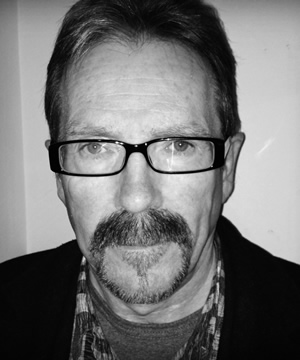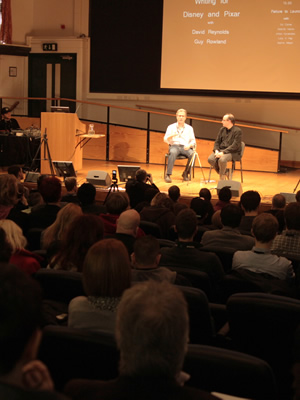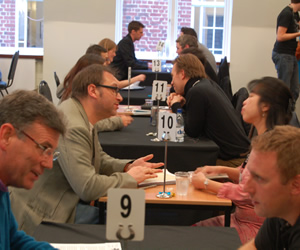Paul Bassett Davies - London Screenwriters' Festival interview

The London Screenwriters' Festival (LSF) - the world's biggest professional event for writers - takes place in London at Regent's College for three days in October every year. To get a comedy angle on whether it's worth attending, we've asked Paul Bassett Davies a few questions here...
Hi Paul. To begin with, perhaps we could ask you to introduce yourself for those that may not be aware of who you are...
I started off in multimedia theatre. Then I did a series of one-man shows, two of which were Perrier Award finalists at Edinburgh. I began writing for radio (Weekending, News Huddlines, my own sitcom with Jeremy Hardy) then TV (Jasper Carrott, Spitting Image, Smith & Jones, Rory Bremner etc) and I also wrote a lot of corporate films and events (excellent scriptwriting training). I wrote the screenplay for the feature animation film of The Magic Roundabout (if you're old enough to read this by yourself, it's not for you).
I've written several plays for BBC radio, who have just commissioned my new sitcom called Reception. I've also got a book coming out... as the dog said after he ran into a library and ate a paperback (see later).
I got involved with LSF through Euroscript who I work with. I set up the Script Clinics at the festival, where professional Euroscript editors give feedback on writers' projects, which they can send in advance, or just drop by for a workshop. Free to delegates, terrific value, see the Euroscript website for details.
Three years ago I hosted a panel about offensive comedy, with Francesca Martinez and some others, because I'm passionate about free speech and comedy, but also believe we need to work hard, think carefully, act sensitively, and sustain dialogue to resolve what's becoming a major cultural battle. I was then asked to be the creative director of the London Comedy Writers Festival in 2011.
Writing isn't the only thing you've done though... You were also a DJ in a strip club once?
That is correct. It was a dive. But the strippers were very funny people with a great attitude. I was told to play a top twenty hit every alternate record. So I did, then played Beefheart, The Who and Zappa in between. I lasted two weeks.
Ha ha. Anyway, sorry, back on track... As you mentioned, in 2011 you were involved in the Comedy Writers Festival. It was a well-executed and useful event which picked up good feedback and inspired a lot of people. How comes the event is not happening again?
Mainly because putting on festivals like these takes about six months out of your life. If you do two a year, that takes up your whole life. The people behind the festival realised they wanted to do other things - like be writers, make films, etc. There were also a couple of personal reasons. So it was decided to incorporate the comedy element into the LSF and just focus on one big writing festival per year. There will be lots of comedy at this year's LSF.

So what can comedy writers get out of the Screenwriters' Festival then?
A lot. Maybe more than writers focused on any other type of work. Firstly, there are some great speakers. A lot of the writers, directors and producers appearing at the festival work (or have worked) in comedy for film, TV, radio, online and other media. They all have a huge amount of experience to share - not just about writing, but about how to get projects made, what the production process entails, and how to succeed in the industry.
And it is an industry. That doesn't mean your work can't be creative and artistic. But if you want to be a full time, professional writer the clue is in the word 'professional'. Successful comedy writing is a profession and a career. You may not be able to devote yourself full time to writing right now, but the first step is to learn everything you can about writing, and the industry you hope to work in - and which you hope to revolutionise with your amazing work.
A few years ago my agent said: "Writers can't just sit at home and write. You have to get yourself out there." This is truer now than ever. I've been a full time, professional writer for more than twenty years. But I'm on Twitter every day. I write a blog, and contribute to other blogs. I talk to people all the time, about projects, work, and ideas. I teach, and I attend talks and workshops. I'm always working on at least four projects, and they involve some degree of collaboration, either with writers, or producers, or broadcasters or whatever. The point is, I'm constantly communicating. If your ambition is to sit at home, alone, and work on your masterpiece, go ahead. Good luck. You'll need it.
By the way, talking of agents... getting an agent should definitely be a goal. But it's not a magic wand or a passport to success. An agent makes it easier for you to do certain aspects of your work, but you still have to do the work yourself.
The good news is that there are now more opportunities than ever to "get yourself out there", and the LSF is one of the best. The networking opportunities and workshops are just as important as what the experienced speakers can tell you. This is especially true for comedy writers. This is the age of "just do it", and the truth is that big, established broadcasters and producers are trying to catch up with developments in the world of comedy. Three-minute comedy clips on YouTube are getting millions of hits. All it takes to make one is a good idea. Film it on your phone. But make sure that when you go viral, and Channel 4 or Hollywood come calling, you've got a killer third draft sitcom script or romcom movie treatment in your back pocket.
And the best way to "just do it", especially if you're a novice, or you lack confidence, is to do it with other people. Learn from each other. Comedy is ideal for collaboration. Why not get together with other writers, and performers, and put on a topical sketch musical in room upstairs from a pub? Write a ukulele rock opera and perform it in the park. Organise a multimedia happening in a launderette. Take a show to Edinburgh. Whatever. Go for it.
This is not only a good way to work, it's also a good way to get noticed. Let's say I'm a comedy producer with Channel 4. I've got a pile of scripts to read on my desk, all day, every day. I know most of them will be terrible. But hey, what's this? An invitation to a new sketch show in a pub theatre. Now, shall I turn it down, and take these thirty scripts home to read? Or shall I go to the show, where I'll see the work of several new writers, and even if they're all crap nothing will be more than few minutes long, I might see some new actors I can use, and I can have a drink and maybe hang out? No contest.

Great advice Paul. Thinking of this year's LSF. Are there any sessions you're particularly looking forward to?
I'll try to see Simon Beaufoy and Kevin Eldon. I may have a go at one of the pitching sessions (pictured). It's great practice. You never stop learning, and we all need to be kept on our toes by the challenge of making our work stand out in a crowded market. There are also quite a few informal sessions that offer ways to improve your presentation skills and generally hone your craft.
The festival is, it'd be fair to say, a lot of money to attend, especially for those where writing is still currently just a hobby. Do you think LSF does represent good value for money?
I know it's a lot of money, and times are hard. But in a way, that makes some decisions easier. Do you want to be a writer more than you want to do anything else? Is it your passion? Do you have the perseverance you'll need to succeed as a writer? If the answer is 'yes', you should certainly go to the LSF, and you'll definitely get great value from it. It's the only place to be this year if you're serious about writing comedy, or anything else. And it's a lot of fun.
We've secured our readers a discount, which we hope will help. Anyway, to finish, we understand you've just written a book. Here's some space to plug it...
The book is a comic novel called Utter Folly. It's about a young man who visits the family home of a well-to-do friend, in a small Somerset village. By the end of a long Bank Holiday weekend he has learned some harsh lessons about love, loyalty and the landed gentry. He has desecrated a church, become a suspect in an international drug trafficking case, and discovered far more than he ever wanted to know about geriatric S&M. The English upper crust have always been half-baked, and the games they play behind the high, green hedges of their country homes are far more dangerous than croquet.
Great stuff. Thanks Paul!
See you at the festival. Don't forget to check out the Euroscript clinics.
To find out more about Paul's books and other projects see his blog
and/or follow him on Twitter: @thewritertype
This article is provided for free as part of BCG Pro.
Subscribe now for exclusive features, insight, learning materials, opportunities and other tools for the British comedy industry.

